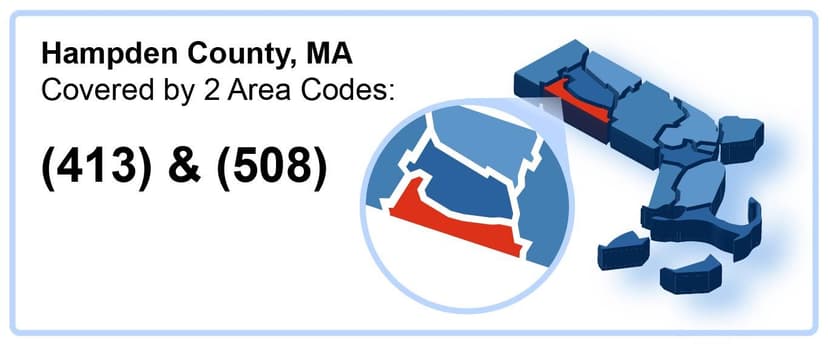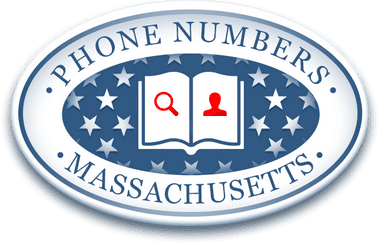What are Hampden County Area Codes?

Numbering Plan Areas are telephone service areas designated by the North American Numbering Plan and identified by 3-digit numbering plan area codes. These area codes begin all 10-digit telephone numbers in North America and show the origins and destinations of phone calls. Maintenance and management of the area codes in Massachusetts is the duty of the Massachusetts Department of Telecommunications and Cable. There are currently two area codes servicing Hampden County, and these are area codes 413 and 508.
Area code 413
Area code 413 was one of the original area codes put in service for Massachusetts in 1947. It has never been split or overlaid and currently covers the western third of the state from Worcester County to the New York state line. Locations in Hampden County covered by this area code include Agawam, Blandford, Chicopee, Holyoke, Palmer, Springfield, West Springfield, and Westfield.
Area code 508
Area code 508 was created in July 1988 as a split from code 617. It currently covers south-central and most of southeastern Massachusetts, including Hampden County. Locations in Hampden County that are covered by this area code are Holland and Wales.
What are the Best Cell Phone Plans in Hampden County?
Data from a 2018 survey report from the National Centre for Health Statistics inferred that wireless telephony was the dominant telephone service in Massachusetts.
The survey, which considered household telephone distribution, noted that 39.9% of adults and 43.7% of minors used wireless-only telephone services. The survey also indicated that only 6.5% of adults and 4% of children used landline phones exclusively.
All the major networks provide wireless services in Hampden County. AT&T has the best coverage with 99.8%, next is Verizon with 96.9%, and T-Mobile with 94.2% coverage. Sprint has the least coverage, but it is still decent at 85.9%. The varying terrain of Massachusetts makes constant coverage hard in some types of places. Smaller network providers called Mobile Virtual Network Operators (MVNO), which run on the major networks’ infrastructure, also operate within the state. These networks purchase resources from the major networks at wholesale prices and pass on these savings to residents by charging lower prices for their services.
Voice over Internet Protocol (VoIP) is a form of telephony technology that allows telephone services to function over a broadband internet connection. Hampden County VoIP service providers provide services for both private homes and businesses. VoIP services are attractive because of their flexibility and lower overall costs. These qualities have made it a reasonable alternative to traditional telephone services.
What are Hampden County Phone Scams?
Phone scams are fraudulent acts performed using telephone services within the county to steal money and sensitive information. The Hampden County Sheriff’s Department and the Massachusetts Office of the Attorney General are the county’s consumer protection agencies. They issue scam alerts on their websites and social media accounts and provide aid to any victims of scams. Residents can also use reverse phone number lookup applications to try and identify any suspicious callers.
What are Medicare Scams?
In these scams, residents receive a call from a scammer claiming to be from Medicare. The scammer claims Medicare is improving benefits or issuing new Medicare cards and asks the target to provide sensitive information to update their account. The scammers sometimes get very aggressive, threatening to cancel the residents’ Medicare coverage if the information is not provided. Sometimes the scammers ask for confirmation of birth dates, Medicare details, or social security numbers as part of the account update. These are attempts to obtain sensitive information and use this information to steal your identity.
Do not give any sensitive information during an uninitiated phone call, no matter how convincing or aggressive the caller becomes. Medicare will never call you and make demands, and all new documentation and cards will come to you directly. If you have any questions about your health coverage, contact Medicare directly at 1-800-633-4227.
What are the Social Security Scams?
Scammers can spoof their caller IDs to show caller information of trusted organizations like the Social Security Administration. They do this to give their scams a feeling of legitimacy and increase the likelihood of fooling their target. The scammer will inform the resident that their Social Security number has been compromised over alleged criminal activities and suspended. The scammer then demands money to fix the issue or sensitive information to update the resident’s profile and prevent their account suspension.
Do not give any sensitive information to any stranger over an unsolicited call. The SSA will never call and ask you to provide them with information. Hang up the call immediately the caller starts to ask for information the SSA should already have. If you have any questions, you can contact the SSA directly at 1-800-772-1213. Residents are encouraged to file reports of all encounters with scammers impersonating social security employees to their Office of The Inspector General. Residents can also put unknown numbers through a reverse phone number lookup application to shed light on these callers’ identities.
What are Law Enforcement Impersonation Scams?
The Hampden County Sheriff's Department has informed Residents via its website and social media pages of fraudsters impersonating officers of the department. These scammers call up unsuspecting residents and threaten them with arrest if they do not pay bogus fines for missing jury summons and parking tickets. The catch is the callers want the payments to be made outside official channels and with irregular methods like bitcoin, wire transfers, and prepaid debit cards. The callers usually call repeatedly, getting more threatening and aggressive with each call.
Do not give any money to these callers, no matter how aggressive they become. The Sheriff’s Department will never call to demand money for any reason and never accept payments outside official channels. If the Sheriff’s Department needs to contact you, an officer will most likely come in person to invite you to the station. Residents that have been victimized by these types of scammers or received these types of calls are advised to call the investigations unit at 413-858-0116.
What are Fake Charity Scams?
Residents targeted by these scams usually receive a call from a scammer claiming to represent a charity soliciting funds for a worthy cause. The scammers will say anything to deceive the residents into parting with cash or banking information to process a donation.
Do not give out personal information or banking information to strange callers on unsolicited phone calls. A lot of these are scammers trying to steal your information and your money. If you want to donate to a charity, ask questions and investigate the charities available thoroughly before deciding. The Massachusetts Attorney General’s Office Non-Profit Organizations/Public Charities Division has information on existing charities in the state. The division also provides tips on how to donate to legitimate charities without falling prey to scammers. Residents may also protect themselves by using reverse phone number lookup applications to answer the question “who is this number registered to?”
What are Robocalls and Spam Calls?
A robocall is an automated call service that dials numbers and plays prerecorded messages when the calls are answered. The technology was developed initially for telemarketers, business, and political organizations to reach many people with little human contact. For this reason, residents may already be used to answering these forms of calls. Scammers have co-opted this technology as it provides a medium for them to target residents covertly. The recorded messages on these robocalls are designed to fool residents into revealing sensitive personal information. Residents who receive such calls can report them to the Federal Trade Commission and the Federal Communications Commission. Residents can also put such numbers through a phone number lookup application to retrieve information about these scammers.
Some ways to avoid falling victim to illegal robocalls are listed below:
- Cut the call immediately you realize it is a robocall. Do not follow any instructions given by the recording, even if it is directions to speak to a live agent. Obeying these instructions only notes your number as real and marks it for more robocalls.
- Put calls from suspicious numbers through to voicemail and only call back callers that left legitimate messages.
- Register your numbers with Massachusetts Do Not Call List and the National Do Not Call Registry. Legitimate users of robocalls subscribe to these lists and avoid calling numbers on it.
- Download and install a free phone number lookup on your phone to identify and block robocalls.
- Report any experience with illegal robocalls to the Federal Trade Commission (FTC) by filing a complaint online or calling 1(888)382-1222.
How Can You Spot and Report Hampden County Phone Scams?
Scammers try to modify old scams to fit modern times, new methods like phone spoofing help scammers impersonate trusted institutions and give their scams legitimacy. An excellent way to avoid being a victim of scams is to be aware of the ones in your area and be educated on how they work. Telltale signs that a call is from scammers include the following:
- Threatening calls from law enforcement who demand payment to prevent arrests. Law enforcement officers will never do this,
- Callers, claiming to be from utility companies and threatening immediate service disruption if payments are not made to them.
- If you receive robocalls when your numbers are already on the state, and national do not call registers, they are scam calls.
- Any caller who actively tries to prevent you from confirming the information they give during the call. These are like scammers with no proof to back their stories.
- Any caller from a government agency who demands payments in untraceable mediums like wire transfers, gift cards, bitcoin, and prepaid debit cards.
Hampden County residents try to identify suspicious callers using phone number lookup applications to identify callers by name, number, or address. Government agencies act as consumer advocates in the county and protect residents from scams and other unfair business practices. Some of these are listed below:
Local Law Enforcement
The Hampden County Sheriff’s Department is the primary law enforcement for the county. Along with the police departments of the individual cities and towns, they are responsible for protecting residents from scammers. The Sheriff’s Department issues regular scam alerts and information about scams in the county on their website and social media pages. Residents that have experienced cons can contact the sheriff’s department investigations unit at 413-858-0116.
State Division of Consumer Protection
The Massachusetts Office of the Attorney General acts as the consumer advocate for the state. They provide education about scams and issue scam alerts on their website. Residents should report any experiences with scammers by filing a complaint online or calling the consumer specialists at (617) 727-8400.
Federal Communications Commission (FCC)
The Federal Communications Commission is a nationwide regulation body for communication and its mediums. It monitors communications using media like phone calls, robocalls, and text messaging. Its website provides tips for stopping robocalls and a guide to spotting spoofed numbers. Residents that have been targeted by phone scams are advised to file a complaint on their website or call at 1-888-(225-5322).
Federal Trade Commission (FTC)
The Federal Trade Commission is the consumer advocate for the whole of America, it protects residents from scams and unfair business practices. It issues scam alerts via its website and operates the National Do Not Call Registry. Residents who have experienced cons can call the FTC at 1(888)-382-1222 or file a report online.
